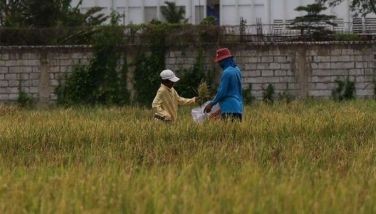Yearender: Agriculture growth limited by typhoons, global economic crisis
MANILA, Philippines - Despite a higher budget of P47 billion – fourth biggest in this year’s national budget – growth in the agriculture sector almost ground to a halt as two devastating typhoons and the global economic meltdown took their toll on the sector.
The Department of Agriculture (DA), is projecting a minimal growth of 0.5 percent to 1.5 percent, citing the devastating effects of a series of typhoons during the latter part of the year which destroyed up to P11.7 billion worth of crops that included 1.3 million metric tons of palay (paddy rice) and about 46,000 tons of corn, as well as other high-value commercial crops.
The crops subsector accounts for half the total agricultural production, while palay production alone accounts for 15 percent of total farm output.
The destruction wrought by typhoons Ondoy and Pepeng, mainly in Luzon, prompted the National Food Authority (NFA) to go on a rice buying binge before 2009 ended, causing international rice prices to spike upwards anew.
The Philippines, which has become the world’s Number One importer of rice, is closely watched whenever it conducts a public bidding for its rice imports.
The Philippines has repea-tedly been criticized for its public tenders which tends to drive up world rice prices.
The NFA’s rice purchases, which are subsidized by the National Government, is one of the major contributors to the NG’s uncontrolled budget deficit.
Thus, despite repeated po-licy pronouncements of improving rice self-sufficiency, the DA – citing the need to ensure food security – continues to embark on costly rice importations.
In his Christmas 2009 message, outgoing Agriculture Secretary Arthur C. Yap, acknowledged that “the year 2009 has had its share of trials and triumphs for us at the DA and to the millions of Filipino farmers and fishers.
“Weather disturbances such as Ondoy and Pepeng damaged billions worth of crops and other farm commodities, properties and infrastructure. “Crude prices also remain high, which in turn prop up prices of farm inputs notably fertilizers.
“All of these eventualities – plus the global economic meltdown that dampens investments and reduces purchasing power – have slowed down the agriculture industry to a virtual standstill,” Yap admitted.
However, Yap remains optimistic that “for 2010, we see the continuation of increased investments in infrastructure and technology, provision of interventions and promotion of agri-business among farmers and fishers for them to have a stable and more profitable livelihood.”
Unfortunately, for 2010, the DA’s budget allocation has been pared down to P37.8 billion.
However, as what happened with the 2009 budget where the DA’s initial approved budget of P41.2 billion eventually increased to P47 billion following revisions during the bicameral conference committee of the final budget bill – the 2010 allocation may still be boosted anytime during the whole budget hearing and approval process.
Even so, the DA is already fearing the worst for its crop production in 2010, this time from an El Niño weather pattern that could result in droughts in vulnerable palay and corn production areas.
- Latest
- Trending




























